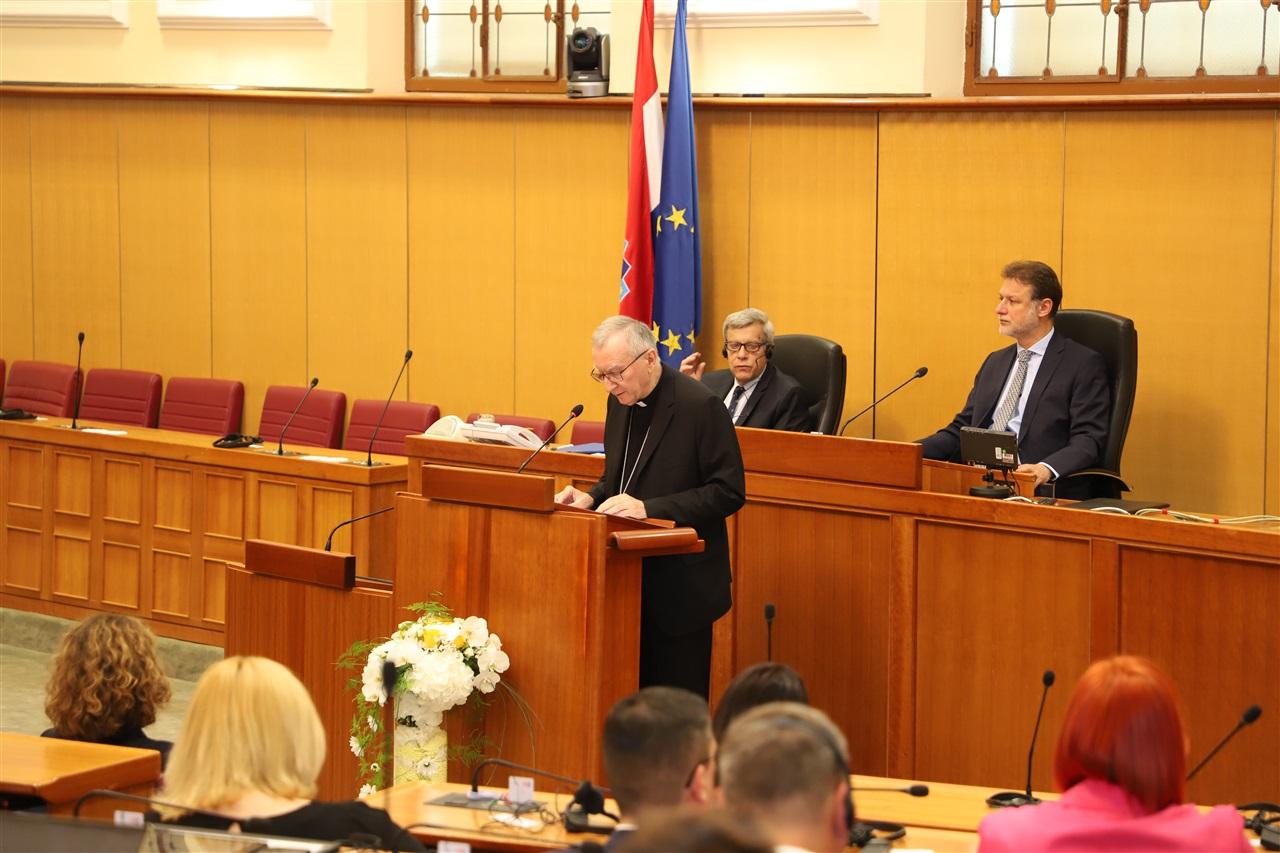
Zagreb - The Vatican's recognition of Croatia 30 years ago will be remembered as an act of strong and resolute support for the legality and legitimacy of the Croatian state before the international community, the Holy See secretary of state, Cardinal Pietro Parolin, said in the Croatian Parliament on Thursday.
That day still represents a sign of strong faith, trust, closeness, commitment and mutual support, he said.
"The recognition of the Republic of Croatia by the Holy See will always be remembered as a legal act through which the Apostolic See gave its strong and decisive support to the legalization and legitimization of the Croatian state before the international community. For both the Republic of Croatia and the Holy See, this act remains even today a sign of strong faith, confidence, closeness, dedication, and mutual support," said the Secretary of State of the Holy See in his address to the Sabor.
Parolin is on a two-day visit to Croatia on the occasion of the 30th anniversary of the Holy See's recognition and the 25th anniversary of the ratification of three agreements between them.
He attributed huge credit for the recognition to Saint John Paul II.
The pope did it uncompromisingly and without hesitation because of his firm conviction of the righteousness of that goal and its basis in international law, notably the right of the Croatian people to self-determination, the cardinal said.
Pope John Paul II confirmed that by visiting Croatia three times, and each visit was "profoundly significant both legally and spiritually in its own historical moment," Parolin added.
John Paul II visited Croatia in 1994 during the Homeland War, in 1998 for the beatification of Cardinal Alojzije Stepinac, and in 2003 when Parolin said, the young Croatian state was already more mature.
"Saint John Paul II had a particular respect for the Croatian people and, apart from his distinguished love for these people, he understood it deeply. Perhaps as nobody else, this pope – a Polish pope – understood the heavy burden of history, but also that of injustice and suffering to which Croatians were exposed as Slavic people in their centuries-old aspiration to have their own State."
In Stepinac, he added, John Paul II saw the personification of the Croats' consistency and firmness, beatifying him and declaring him a martyr in the Marija Bistrica Marian shrine in 1998.
Nothing new about Blessed Alojzije Stepinac's canonisation
Yesterday, Parolin told the press that for now, nothing has changed regarding Stepinac's canonisation because Pope Francis believes it must be a moment of unity for the whole Church, not a cause of conflict or opposition.
Speaking of the Croatia-Holy See agreements today, he said they were not at the expense of other religious communities. On the contrary, he added, they may serve as a model for people of other denominations.
"The accords stipulated between the Republic of Croatia and the Holy See ought not to be viewed and valued to detriment of other religious communities. On the contrary, they could eventually be considered as a model also for people of other faith-based groups," said the dignitary.
Croatian history inconceivable without Catholicism
Parliament Speaker Gordan Jandroković said in his welcome speech that Croatian history was inconceivable without the role of the Catholic Church and Christianity which, he added, were deeply woven into the Croatian people's being.
Through the centuries, the Church and faith have been the guardians not just of the religious, but also the national and cultural identity of Croats, he said.
The Vatican's recognition was very important because it was a message and incentive to all who still had doubts about recognising Croatia, Jandroković said.
The agreements with the Vatican regulate many areas, from legal and economic issues to upbringing, culture, charity work, and the spiritual guidance of Catholics, he said. Thanks to those agreements, he added, other religious communities in Croatia have regulated their relations with the state.
Jandroković went on to say that Croatia was especially concerned about the status of Croats in Bosnia and Herzegovina, calling on the Holy See to use its moral authority to help so that a final solution was found that would guarantee the equality of all three constituent peoples in BiH.